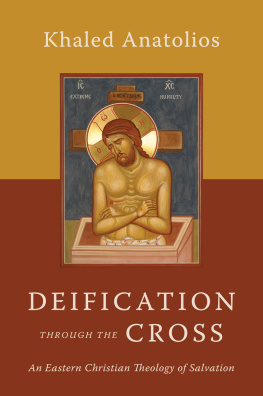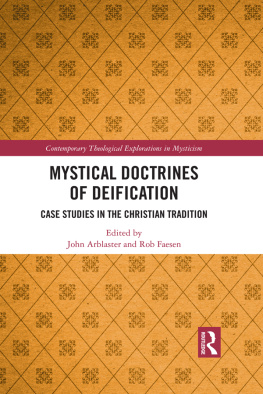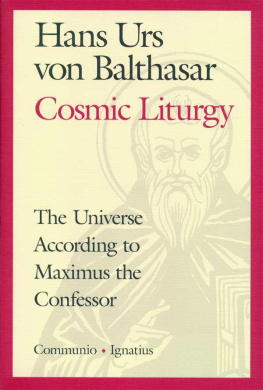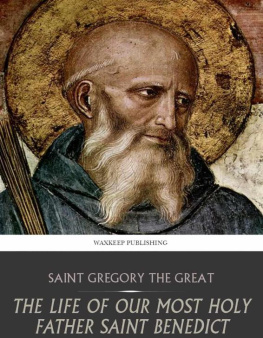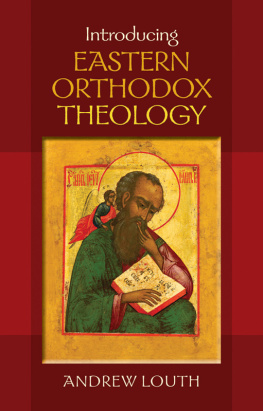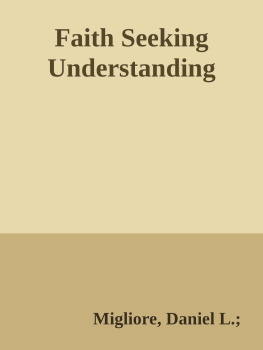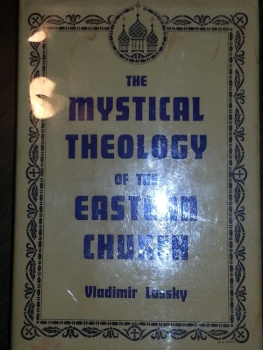Daniel Haynes - A saint for East and West: Maximus the Confessors contribution to Eastern and Western Christian theology /
Here you can read online Daniel Haynes - A saint for East and West: Maximus the Confessors contribution to Eastern and Western Christian theology / full text of the book (entire story) in english for free. Download pdf and epub, get meaning, cover and reviews about this ebook. year: 2019, publisher: Wipf and Stock Publishers, genre: Religion. Description of the work, (preface) as well as reviews are available. Best literature library LitArk.com created for fans of good reading and offers a wide selection of genres:
Romance novel
Science fiction
Adventure
Detective
Science
History
Home and family
Prose
Art
Politics
Computer
Non-fiction
Religion
Business
Children
Humor
Choose a favorite category and find really read worthwhile books. Enjoy immersion in the world of imagination, feel the emotions of the characters or learn something new for yourself, make an fascinating discovery.

- Book:A saint for East and West: Maximus the Confessors contribution to Eastern and Western Christian theology /
- Author:
- Publisher:Wipf and Stock Publishers
- Genre:
- Year:2019
- Rating:3 / 5
- Favourites:Add to favourites
- Your mark:
- 60
- 1
- 2
- 3
- 4
- 5
A saint for East and West: Maximus the Confessors contribution to Eastern and Western Christian theology /: summary, description and annotation
We offer to read an annotation, description, summary or preface (depends on what the author of the book "A saint for East and West: Maximus the Confessors contribution to Eastern and Western Christian theology /" wrote himself). If you haven't found the necessary information about the book — write in the comments, we will try to find it.
Daniel Haynes: author's other books
Who wrote A saint for East and West: Maximus the Confessors contribution to Eastern and Western Christian theology /? Find out the surname, the name of the author of the book and a list of all author's works by series.
A saint for East and West: Maximus the Confessors contribution to Eastern and Western Christian theology / — read online for free the complete book (whole text) full work
Below is the text of the book, divided by pages. System saving the place of the last page read, allows you to conveniently read the book "A saint for East and West: Maximus the Confessors contribution to Eastern and Western Christian theology /" online for free, without having to search again every time where you left off. Put a bookmark, and you can go to the page where you finished reading at any time.
Font size:
Interval:
Bookmark:
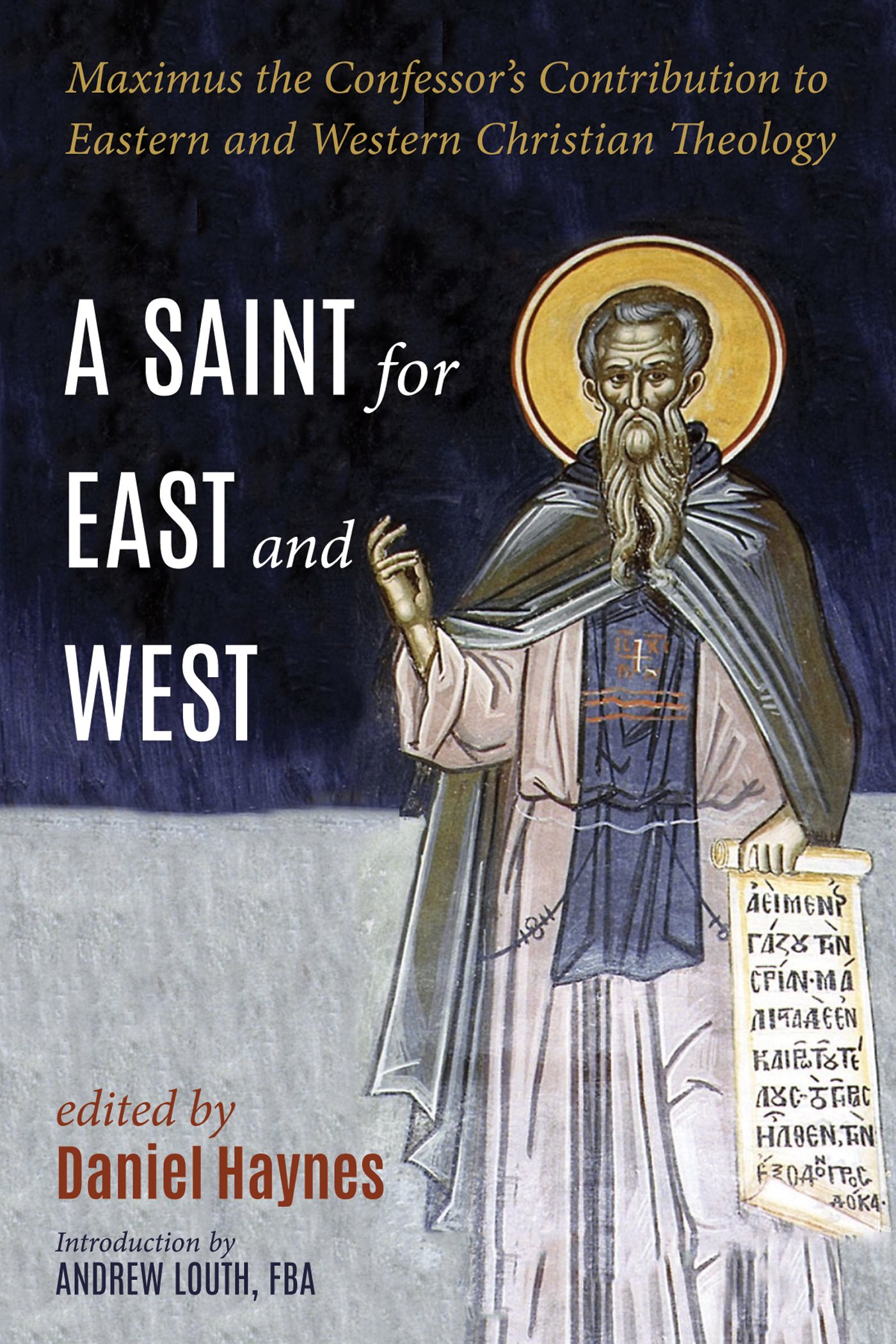
Maximus the Confessors Contribution to Eastern and Western Christian Theology
Edited by Daniel Haynes

I n many areas of contemporary culture, it seems incongruous to consider that a figure from the past could inform present-day life. However, there are those luminous saints of old who challenge us to think things anew. St. Maximus the Confessor is one such saint. Despite the fact that Maximus is a deeply cherished saint of both Eastern and Western Christian traditions, his theology is still not very well known or understood.
Over the last couple of decades, there has been a renaissance of interest in the thought of the Confessor in both traditions. Numerous monographs and articles have been published attesting to his brilliance and importance for understanding central dogmas of both East and West. There is even an interest in aligning Maximus metaphysics with modern developments in science. The noted Maximus scholar Paul Blowers has recently explored the compatibility of Maximus doctrine of the logos and logoi with the scientific theory of evolution. I believe Maximus theology has the greatest potential to open up ecumenical dialogue and understanding between the major branches of Christianity. And it is this prospect which sparked not only my Ph.D. dissertation on Maximus doctrine of grace at the University of Nottingham, but principally the multi-day workshop on his theology at the sixteenth International Conference on Patristic Studies at Oxford University in 2011 , out of which the present volume emerged.
In this book, leading scholars, spiritual masters, and theologians engage with Maximus thought in creative ways. They examine the historical influences and intellectual trajectories of Maximus theological synthesis in depth, and new theological vistas open up to create possible paths forward in ecumenical understanding.
For practical purposes the book is broken up into three key parts: () reception and influence; () anthropology, Christology, and spirituality; and () ontology and metaphysics. Maximus vision of the cosmos and the Christian life would not make such distinctions, but this approach was chosen in order to make his theology more esculent for the reader. Andrew Louth provides an erudite introduction to the importance of Maximus theology for today and how the authors in this volume contribute towards it. Then in part one, Adrian Guiu, Edward Siecienski, and Christophe Erismann trace the historical and intellectual pathways of Maximus theological influence. Part two unpacks Maximus moral and spiritual theology in relation to his Christology and cosmic vision. Metropolitan Kallistos (Timothy Ware), Adam Cooper, David Bradshaw, and Luis Granados offer fresh perspectives on these classical Maximian subjects. Finally, in part three hieromonk Trnen, Baron Rowan Williams, John Milbank, Nikolaos Loudovikos, Torstein Tollefsen, Vladimir Cvetkovi, and Joshua Lollar venture deep into Maximus ontology and metaphysics of creation. Through their analyses, each contributor shows how Maximus thought took shape in Eastern and Western Christian theology. The Confessors theological genius creates a vision of the world that makes him truly a saint for East and West.
Daniel Haynes
Feast of William Laud, 2017
. Blowers, Unfinished Creative Business: Maximus the Confessor, Evolutionary Theodicy, and Human Stewardship in Creation.
I would first like to thank my family for their support of the many hours of labor on this project. Without their grace and patience, this book would not have been possible. The international team of scholars in this volume is world class, and the generosity of their agreement to contribute towards its creation is beyond measure. Of course, the gathering together of such diverse perspectives on Maximus theology could not have occurred without the support of the organizers of the quadrennial International Conference on Patristic Studies at Oxford University, where the multi-day workshop on the Confessors thought was held in August 2011 . Exceeding thanks goes to my Ph.D. supervisor, Dr. Mary Cunningham, for her advice and support in organizing the Maximus workshop. Finally, I would like to thank our publisher, Wipf and Stock, for their immense patience with the torpid pace of manuscript preparation. All of these elements came together to share this book with the world.
David Bradshaw is a professor of philosophy at the University of Kentucky in Lexington. His research focuses on the ways that ancient Greek philosophy shaped medieval philosophy and religious thought, and how these, in turn, contributed to the formation of modernity. He is most celebrated for his book Aristotle East and West: Metaphysics and the Division of Christendom ( 2007 ) with Cambridge University Press. Professor Bradshaw also serves in an editorial capacity on many projects with the Council for Research in Values and Philosophy.
Adam G. Cooper is a senior lecturer at the John Paul II Institute for Marriage and Family in Melbourne Australia. His research interests focus on incarnational and historical theology, as well as the interface between theology and philosophy. He has published scholarly and popular articles on theology and the church fathers, with a focus on the moral theology and theology of the body. His STL thesis was entitled Performative Nuptiality: A Liturgical Theology of the Body. His books are The Body in Saint Maximus the Confessor: Holy Flesh, Wholly Deified () and Life in the Flesh: An Anti-Gnostic Spiritual Philosophy ( 2008 ), both with Oxford University Press. He is currently preparing a third book on deification in contemporary Catholic theology.
Vladimir Cvetkovi is an independent researcher in Gttingen, Niedersachsen, Germany. His previous appointments include an external lectureship at the University of Aarhus in Denmark and a visiting researcher at the University of St. Andrews and the University of Oslo. His research is primarily centered in ecumenical theology and how confessional beliefs took shape in Eastern and Western theology, but his work also explores theological metaphysics in Eastern Orthodoxy. He recently published God and Time: St. Gregory of Nyssas Teaching on Time (in Serbian), and has a forthcoming volume on the newly canonized archimandrite Justin Popovic entitled Heiliger Justin (Popovi) von elije , ber den kumenismus.
Christophe Erismann is a professor in the Byzantine and Modern Greek Studies Department at the University of Vienna. He has held positions at the Universities of Cambridge, Helsinki, and Lausanne, where he taught medieval philosophy for several years as Swiss National Science Foundation Professor. Since autumn 2015 , he leads the European Research Council project (CoG 648298 ) Reassessing Ninth Century Philosophy. A Syncronic Approach to the Logical Tradition at the Institute for Byzantine Studies, University of Vienna. His research focuses on the reception of Greek logic (mainly Aristotles Categories and Porphyrys Isagoge ) in late ancient, patristic, and early medieval philosophy. He is the author of Lhomme commun: la gense du ralisme ontologique durant le haut Moyen ge ( 2011 ).
Rev. Professor Luis Granados Garcia, D.C.J.M. , is a priest of the Disciples of the Hearts of Jesus and Mary and teaches at the Pontifical John Paul II Institute for Studies on Marriage and Family and at the Universidad Eclesistica San Dmaso in Madrid, Spain. He has published numerous articles and church publications, such as The End of History: The Parousia of Christ as Cosmic Liturgy ( 2012 ); El misterio de la fecundidad: La comunicacin de su Gloria ( 2013 ); From Ash to Water: Meditations on Lent ( 2014) ; and Water from the Rock: Meditations from Palm Sunday to Divine Mercy Sunday ( 2014 ).
Font size:
Interval:
Bookmark:
Similar books «A saint for East and West: Maximus the Confessors contribution to Eastern and Western Christian theology /»
Look at similar books to A saint for East and West: Maximus the Confessors contribution to Eastern and Western Christian theology /. We have selected literature similar in name and meaning in the hope of providing readers with more options to find new, interesting, not yet read works.
Discussion, reviews of the book A saint for East and West: Maximus the Confessors contribution to Eastern and Western Christian theology / and just readers' own opinions. Leave your comments, write what you think about the work, its meaning or the main characters. Specify what exactly you liked and what you didn't like, and why you think so.

